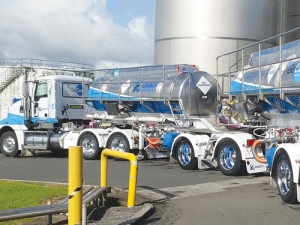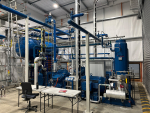This will become more common as impending Tier 5 regulations – due in 2020 – see most engine suppliers taking up the technology in varying degrees.
SCR (selective catalytic reduction) takes place when DEF (diesel exhaust fluid), a clear solution of 32.5% urea and 67.5% de-mineralised water, is injected into the post combustion exhaust stream and converts NOX – which causes smog -- into harmless nitrogen and water.
The good news for Kiwi users is that DEF is produced on our doorstep at the Ballance Agri-Nutrients plant at Kapuni, Taranaki. Opened in 1982, this is the country's only ammonia/urea fertiliser plant, converting natural gas from the nearby Kupe field -- and atmospheric nitrogen -- into ammonia, the base for urea production.
The Ballance Go Clear DEF plant started producing in September 2010 after an initial $2 million spend on a product blending plant, storage vessels and laboratory testing facilities. Then in 2015 came a $2m top-up to increase storage capacity to 600,000L and plant capacity to 14m L annually, subject to planning, logistics and consumer demand.
The market now requires around 10 million of DEF, rising by 25-30% a year -- a big production and delivery effort; Fonterra relies on Go Clear for its 550 milk collection tankers needing SCR.
'Urban legend' may be that DEF can be made in the garden shed; not so, as very tight production specifications mean home brewing wouldn't work.
Explains Paul Stewart, technical manager at Kapuni, "In terms of specification, the de-mineralised water we use in our manufacture is 100 times cleaner than standard mineral water used in most chemical processes.
"Trace elements have to be removed to prevent damage to SCR systems and this requires us to use a mixed resin purification stage to meet the standard."
Quality control is paramount: each batch gets 1.5 days in-house testing by a dedicated technician -- one of nine on site -- before bulk product is released for storage and distribution from Whangarei to Bluff.
Chevron, Caltex and Mobil and others sell the product, which is easy to store and use. Packaged products ideally need to be are stored at no more than 25 degrees C: higher temperatures might lead to some minor degradation. Shelf life is at least 12 months.
"The plant at Kapuni gives Kiwi users key benefits -- local availability, stringent quality control and a fast growing fuel stock network," says Marcus Butterfield, product specialist for distributor IXON.
"While urea and de-mineralised water can be sourced overseas, quality may vary, traceability can be difficult and the shipping of raw materials and their packaging can have a big impact on emissions."
The Kapuni plant does it all: stringent quality control, guaranteed traceability and a solid chain of custody; and dedicated delivery vehicles ensure product on time in peak condition.











